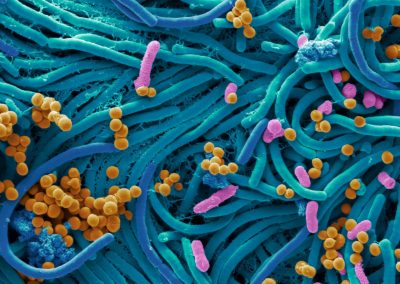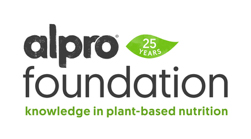SOY SERIES: Part 2 of 3
Soy Isoflavones in the Endocrine System
Tuesday 20 September 2022
Webinar: 140 mins
SOY SERIES: Part 2 of 3
Soy Isoflavones in the Endocrine System
Tuesday 20 September 2022
Webinar: 140 mins
Free
120mins
A GLOBAL EVENT FOR HEALTH PROFESSIONALS, POLICY MAKERS, ACADEMICS AND STUDENTS
This event is the part two of a special three-part webinar series on The Future of Soya for Health and Sustainability – Sharing Global Learnings. Soy has been part of the traditional Asian cuisine for centuries – and it is fast becoming an increasing part of the global diet. In this series, you will hear from internationally-acclaimed experts discussing the latest research across the globe and exploring the future of soy – for both health and sustainability.
Part 2 of this series will provide you with an overview of the very latest significant peer-reviewed research papers on soy and the endocrine system. It will look at the latest data on safety of soy for human consumption as well as opinion among research and nutrition professionals. You will learn how soy impacts on women’s health particularly in relation to bone and fat metabolism. This part 2 event will also explore the latest evidence in relation to soy and breast cancer risk. Finally, some of the latest research in relation to soy isoflavones beyond the estrogen receptors will be explored.
This webinar has been designed for
- Academics
- Industry professionals
- Policy makers
- Child health professionals
- Dietitians
- Nutritionists
- Other health professionals with an interest in this topic
The webinar will include recorded lectures from the speakers; each will also answer audience questions, which you can submit in advance when you register. At each live session, Chair Tanya Haffner will be providing insights; nutrition expert with experience in soy Elphee Medici will also be available to address some live questions. A full question and answer document will also be provided to attendees after the events.
Watch part one of the series on-demand.
Details of part three (November) of the series will be released closer to the live sessions.
Help us to continue providing expert nutrition learning
If MyNutriWeb has helped you deepen your knowledge of dietary and nutritional subjects, join us to help support and educate people to eat well for themselves and the planet. Read more...

Programme outline
Chair’s welcome
Tanya Haffner
CEO, Registered Dietitian, MyNutriWeb
Tanya Haffner's biography
Tanya is an Irish born, UK trained dietitian and nutritionist. She previously founded Nutrilicious Communications, the first solely dedicated nutrition communications agency in the UK, which has supported multiple change agents in food and health over 20 years. Now, the culmination of her mission to help everyone to eat well is the award winning MyNutriWeb.com, which uses all her experience and network, curating and running authentic influential learning and dialogue events, including traditional conferences, policy, networking, and training opportunities. Supporting and empowering all health professionals and other change agents in food with nutrition matters is in Tanya’s view, critical to improving citizens health whilst also helping to protect our planet. Tanya was awarded the Caroline Walker Trust Award for Freelance Nutritionist of the Year 2021 which recognises distinctive and outstanding work in promoting public health which maintains and advances the standards of food and nutrition. Tanya has recently taken up the role of chair of the BDA Sustainable diets group and is looking forward to working with the BDA to help advance the professions impact on sustainable eating.

Human Research and the Safety of Soy foods
Professor Mark Messina
Director of Nutrition Science and Research, Soy Nutrition Institute Global
Professor Mark Messina’s biography
Dr. Messina has spent the past 3 decades studying the health effects of soyfoods and soybean components. He has published more than 100 articles and book chapters for health professionals and has given more than 700 presentations to both consumer and professional groups in 55 countries.
Lecture outline and learning objectives
Soy foods are controversial because of their isoflavone content. Animal studies have raised concerns that isoflavone intake may exert untoward effects in some individuals. This session will explore clinical and observational studies which confirm that soy foods are safe with the exception of those relatively rare individuals who are allergic to soy protein.
Watch this session to:
GAIN CLEAR UNDERSTANDING OF:
• Effect of soy on breast tissue
• Effect of soy on thyroid function
• Effect of soy on male hormones and fertility
BE AWARE OF:
• Animal studies suggesting soy has adverse effects
• Results of observational study involving low-soy-intake population
BE ABLE TO:
• Respond to concerns that soy foods are harmful

Soy and Women’s Health: A focus on bone and fat metabolism
Professor Yoshiko Ishimi
Tokyo NODAI Research Institute, Tokyo University of Agriculture, Tokyo
Professor Yoshiko Ishimi’s biography
Dr. Yoshiko Ishimi graduated from the Faculty of Pharmaceutical Sciences, Tokyo University of Science. She obtained a PhD from the Dental School of Showa University in 1991. Dr. Ishimi was a Chief of the Department of Food Function and Labeling of the National Institute of Health and Nutrition from 2009 to 2017.
Lecture outline and learning objectives
This session will explore the health effects of soybean on bone and fat metabolism in women, including the co-operative effects of soy isoflavones and exercise on bone and fat metabolism in postmenopausal Japanese women, and lifestyle recommendations to support women’s health.
Watch this session to:
GAIN CLEAR UNDERSTANDING OF:
• Soy protein and its impact on serum cholesterol
• Soy isoflavones weak estrogenic activity
• How soy isoflavones and exercise cooperatively act on bone and fat metabolism in postmenopausal women
BE AWARE OF:
• The role of soy protein in regulating fat metabolism
• The role of soy isoflavones in maintaining bone metabolism in postmenopausal women
• The cooperative effects of excise and isoflavones on bone metabolism
BE ABLE TO:
• Use soy-based products as a dietary approach in helping to maintain fat metabolism
• Use soy-based products as a dietary approach in helping to maintain bone metabolism in postmenopausal women
• Advise on the cooperation of exercise and soy intake to postmenopausal women

Evidence on Soy foods and breast cancer risk
Professor Sabine Ellinger
Department of Nutrition and Food Sciences, Human Nutrition, University of Bonn
Professor Sabine Ellinger’s biography
Sabine Ellinger has been Professor for Human Nutrition at University of Bonn since 2020, and prior to this held a position as Professor for Nutrition Science at Niederrhein, University of Applied Sciences. Her research interests include cardiometabolic effects of selected phytochemicals or corresponding foods, potential of dietary measures to protect against diet-related diseases, optimization of nutrient supply in conditions/diseases with increased requirements.
Lecture outline and learning objectives
Soy food consumption has been associated with a reduced risk of breast cancer, but is there a causal link? This session will provide an overview of randomized controlled trials (RCTs) which have investigated the effect of soy consumption on biomarkers of breast cancer. We’ll review what is already known from RCTs and what should be addressed in future studies.
Watch this session to:
GAIN CLEAR UNDERSTANDING OF:
• To understand the mechanisms by which soy isoflavones might protect from breast cancer
• To obtain an overview on randomized controlled studies investigating the effect of soy food/soy isoflavones on breast cancer
• To understand why risk of bias has to be considered to judge the evidence
BE AWARE OF:
• Physiological considerations explaining why isoflavones may protect from breast cancer
• The state of the research on the basis of RCTs
• The risk of bias in the research
BE ABLE TO:
• Critically review the methodological aspects of RCTs in this field of research
• Critically review RCTs for the risk of bias
• Understand how to design suitable RCTs of high quality to close scientific gaps

Benefits of isoflavones beyond the estrogen receptors
Professor Hirofumi Tachibana
Professor, Kyushu University
Professor Hirofumi Tachibana’s biography
Professor Tachibana started his research career with studies on the cellular immunology. His research has focused on the physiological mechanisms of the functional food factors at a molecular level and he has published more than 300 articles in international and domestic journals. Prof. Tachibana’s research has identified some sensory systems that respond to functional food factors.
Lecture outline and learning objectives
Isoflavones are recognised for their health benefits worldwide. Epidemiological studies revealed that Asian populations who consume high amounts of soy and soy isoflavones have a lower risk for breast cancer than Western populations. This lecture will highlight the effects of isoflavones on cancer prevention.
Watch this session to:
GAIN CLEAR UNDERSTANDING OF:
• Physiological functions of soy isoflavones
• The molecular mechanisms on physiological functions of soy isoflavones
• The importance of soy isoflavones intake
BE AWARE OF:
• Recognition of anti-cancer action of soy isoflavones
• How soy isoflavones can contribute to cancer prevention
BE ABLE TO:
• Appreciate the role of soy isoflavones in health promotion
• Understand the molecular mechanisms on health promotion of soy isoflavones
• Understand estrogen receptor-dependent and -independent actions of soy isoflavones
The lecture will be in Japanese with English subtitles

Elphee Medici, BSc, PGDip
Guest nutrition expert and moderator with experience in soy
Elphee Medici’s biography
Elphee Medici is a nutrition expert with over 30 years’ experience working in the NHS, industry and freelancing. She supports Nutrilicious as a Nutrition Communications Consultant on scientific and consumer communications relating to nutrition, health and sustainability – including soya. Core expertise includes critiquing scientific research, interpreting findings in context of practical implications and authorship of various evidence-based reports.
CPD CERTIFICATE & LEARNING MATERIALS
This event has been approved for CPD by the AfN

Webinar slides and links to other key resources will be sent within a week of viewing the live webinar, along with a separate personalised CPD certificate to save for your files. Add hello@mynutriweb.com to your safe senders to ensure you receive them.
This webinar is being run in association with Alpro Foundation and The Fuji Foundation for Protein Research
About Alpro Foundation
Alpro Foundation is an independent non-profit organisation that was founded in 1996 in order to support scientific research into nutrition and to promote knowledge and awareness of plant-based nutrition, health and sustainability. Various resources for academics, health professionals and students can be found on their website www.alprofoundation.org
About Fuji Foundation for Protein Research
Fuji Foundation for Protein Research was established to support soy protein research and thereby contribute to human health, nutrition and food sustainability.
The Fuji Oil Group established The Research Committee of Soy Protein Nutrition in 1979 in Japan to advance both basic research and applications knowledge relating to soy. This Committee was the forerunner of the Fuji Foundation for Protein Research, a Japan-registered charity that promotes research on plant protein, in particular soy.
Since 1991, the Foundation has made grants to Japan-based research groups investigating plant protein in 4 subject areas:
- Nutrition & health
- Functionality
- Plant cultivation
- Food culture
To date, these awards the focus has been on soy protein research. However, the Foundation plans to expand its activities to other plant proteins and offer grants to overseas researchers from 2023 onwards. English language website www.fujiproteinfoundation.org
Please note, approval of each sponsor and activity is carefully assessed for suitability on a case by case basis. Sponsorship does not imply any endorsement of the brand by MyNutriWeb, its organisers, its moderators or any participating healthcare professional, or their association. Sponsorship funds are reinvested into the creation and promotion of professional development opportunities on MyNutriWeb.
Popular Now

Reframing Dietary Therapies for IBS

Natalie Yerlett: The Gut: Skin Axis

Nutrition for skin health: practical tips for tricky questions
Feature in a Webinar
Webinar guest experts encompass topics relevant to all professionals and change agents in food and health, across all health and business sectors.
Would you like to feature in a webinar, or propose a guest expert?
Sponsor a webinar
MyNutriWeb offers organisations and brands an opportunity to sponsor topics, gaining valuable insights into the viewpoints of professionals within a moderated environment. If there is a topic that you would like to support please get in touch to discuss.
This website is intended only for students or professionals working in food, nutrition and health. If this is you, please click to continue.





